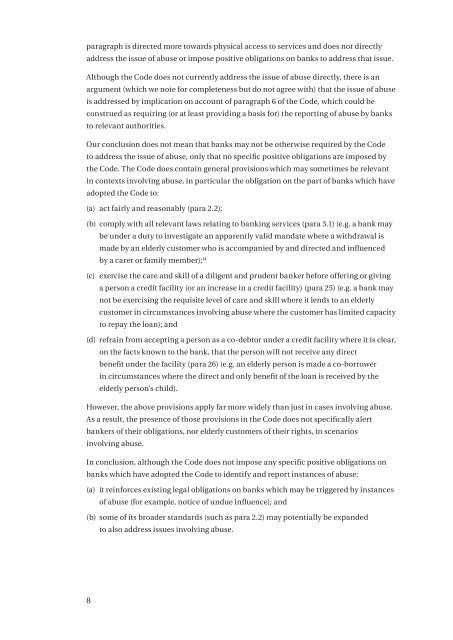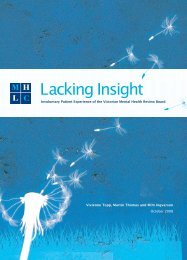Responding to the financial abuse of older people - Loddon ...
Responding to the financial abuse of older people - Loddon ...
Responding to the financial abuse of older people - Loddon ...
- No tags were found...
Create successful ePaper yourself
Turn your PDF publications into a flip-book with our unique Google optimized e-Paper software.
paragraph is directed more <strong>to</strong>wards physical access <strong>to</strong> services and does not directly<br />
address <strong>the</strong> issue <strong>of</strong> <strong>abuse</strong> or impose positive obligations on banks <strong>to</strong> address that issue.<br />
Although <strong>the</strong> Code does not currently address <strong>the</strong> issue <strong>of</strong> <strong>abuse</strong> directly, <strong>the</strong>re is an<br />
argument (which we note for completeness but do not agree with) that <strong>the</strong> issue <strong>of</strong> <strong>abuse</strong><br />
is addressed by implication on account <strong>of</strong> paragraph 6 <strong>of</strong> <strong>the</strong> Code, which could be<br />
construed as requiring (or at least providing a basis for) <strong>the</strong> reporting <strong>of</strong> <strong>abuse</strong> by banks<br />
<strong>to</strong> relevant authorities.<br />
Our conclusion does not mean that banks may not be o<strong>the</strong>rwise required by <strong>the</strong> Code<br />
<strong>to</strong> address <strong>the</strong> issue <strong>of</strong> <strong>abuse</strong>, only that no specific positive obligations are imposed by<br />
<strong>the</strong> Code. The Code does contain general provisions which may sometimes be relevant<br />
in contexts involving <strong>abuse</strong>, in particular <strong>the</strong> obligation on <strong>the</strong> part <strong>of</strong> banks which have<br />
adopted <strong>the</strong> Code <strong>to</strong>:<br />
(a) act fairly and reasonably (para 2.2);<br />
(b) comply with all relevant laws relating <strong>to</strong> banking services (para 3.1) (e.g. a bank may<br />
be under a duty <strong>to</strong> investigate an apparently valid mandate where a withdrawal is<br />
made by an elderly cus<strong>to</strong>mer who is accompanied by and directed and influenced<br />
by a carer or family member); 14<br />
(c) exercise <strong>the</strong> care and skill <strong>of</strong> a diligent and prudent banker before <strong>of</strong>fering or giving<br />
a person a credit facility (or an increase in a credit facility) (para 25) (e.g. a bank may<br />
not be exercising <strong>the</strong> requisite level <strong>of</strong> care and skill where it lends <strong>to</strong> an elderly<br />
cus<strong>to</strong>mer in circumstances involving <strong>abuse</strong> where <strong>the</strong> cus<strong>to</strong>mer has limited capacity<br />
<strong>to</strong> repay <strong>the</strong> loan); and<br />
(d) refrain from accepting a person as a co-deb<strong>to</strong>r under a credit facility where it is clear,<br />
on <strong>the</strong> facts known <strong>to</strong> <strong>the</strong> bank, that <strong>the</strong> person will not receive any direct<br />
benefit under <strong>the</strong> facility (para 26) (e.g. an elderly person is made a co-borrower<br />
in circumstances where <strong>the</strong> direct and only benefit <strong>of</strong> <strong>the</strong> loan is received by <strong>the</strong><br />
elderly person’s child).<br />
However, <strong>the</strong> above provisions apply far more widely than just in cases involving <strong>abuse</strong>.<br />
As a result, <strong>the</strong> presence <strong>of</strong> those provisions in <strong>the</strong> Code does not specifically alert<br />
bankers <strong>of</strong> <strong>the</strong>ir obligations, nor elderly cus<strong>to</strong>mers <strong>of</strong> <strong>the</strong>ir rights, in scenarios<br />
involving <strong>abuse</strong>.<br />
In conclusion, although <strong>the</strong> Code does not impose any specific positive obligations on<br />
banks which have adopted <strong>the</strong> Code <strong>to</strong> identify and report instances <strong>of</strong> <strong>abuse</strong>:<br />
(a) it reinforces existing legal obligations on banks which may be triggered by instances<br />
<strong>of</strong> <strong>abuse</strong> (for example, notice <strong>of</strong> undue influence); and<br />
(b) some <strong>of</strong> its broader standards (such as para 2.2) may potentially be expanded<br />
<strong>to</strong> also address issues involving <strong>abuse</strong>.<br />
8
















